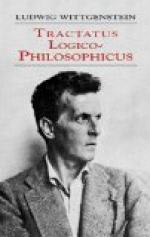6.4312 Not only is there no guarantee of the temporal immortality of the human soul, that is to say of its eternal survival after death; but, in any case, this assumption completely fails to accomplish the purpose for which it has always been intended. Or is some riddle solved by my surviving for ever? Is not this eternal life itself as much of a riddle as our present life? The solution of the riddle of life in space and time lies outside space and time. (It is certainly not the solution of any problems of natural science that is required.)
6.432 How things are in the world is a matter of complete indifference for what is higher. God does not reveal himself in the world.
6.4321 The facts all contribute only to setting the problem, not to its solution.
6.44 It is not how things are in the world that is mystical, but that it exists.
6.45 To view the world sub specie aeterni is to view it as a whole—a limited whole. Feeling the world as a limited whole—it is this that is mystical.
6.5 When the answer cannot be put into words, neither can the question be put into words. The riddle does not exist. If a question can be framed at all, it is also possible to answer it.
6.51 Scepticism is not irrefutable, but obviously nonsensical, when it tries to raise doubts where no questions can be asked. For doubt can exist only where a question exists, a question only where an answer exists, and an answer only where something can be said.
6.52 We feel that even when all possible scientific questions have been answered, the problems of life remain completely untouched. Of course there are then no questions left, and this itself is the answer.
6.521 The solution of the problem of life is seen in the vanishing of the problem. (Is not this the reason why those who have found after a long period of doubt that the sense of life became clear to them have then been unable to say what constituted that sense?)
6.522 There are, indeed, things that cannot be put into words. They make themselves manifest. They are what is mystical.
6.53 The correct method in philosophy would really be the following: to say nothing except what can be said, i.e. propositions of natural science—i.e. something that has nothing to do with philosophy — and then, whenever someone else wanted to say something metaphysical, to demonstrate to him that he had failed to give a meaning to certain signs in his propositions. Although it would not be satisfying to the other person—he would not have the feeling that we were teaching him philosophy—this method would be the only strictly correct one.
6.54 My propositions are elucidatory in this way: he who understands me finally recognizes them as senseless, when he has climbed out through them, on them, over them. (He must so to speak throw away the ladder, after he has climbed up on it.) He must transcend these propositions, and then he will see the world aright.




